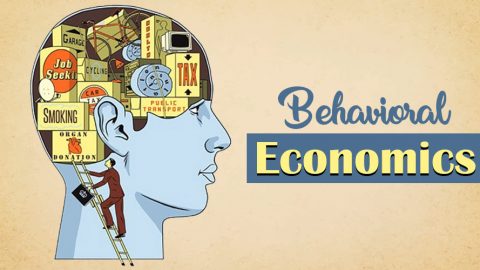Behavioral economics is a field that combines principles from psychology and economics to understand how individuals make economic decisions. It intersects with mental health functioning by examining how cognitive biases, heuristics, and emotional factors affect human behavior in economic contexts, providing insights that challenge traditional economic assumptions.
What is Behavioral Economics?
Behavioral economics, which investigates 1 Miller, J. E., Amit, E., & Posten, A.-C. (2016). Behavioral Economics. Encyclopedia of Global Bioethics, 235–240. https://doi.org/10.1007/978-3-319-09483-0_37 the reasons behind occasional irrational choices and deviations from traditional economic predictions, draws on insights from both psychology and economics to gain a comprehensive understanding of human behavior within economic contexts.
It recognizes that individuals are influenced by cognitive biases, emotions, and social influences, leading to decisions that may not always be in their best interest.
Emerging as a distinct field in the late 20th century, behavioral economics owes much to the influential contributions of psychologists and economists like Daniel Kahneman 2 Tagliabue, M., Squatrito, V., & Presti, G. (2019). Models of Cognition and Their Applications in Behavioral Economics: A Conceptual Framework for Nudging Derived From Behavior Analysis and Relational Frame Theory. Frontiers in psychology, 10, 2418. https://doi.org/10.3389/fpsyg.2019.02418 , Amos Tversky, and Richard Thaler. Their groundbreaking research challenged 3 Horton A. (2019). Causal Economics: A new pluralist framework for behavioral economics that advances theoretical and applied foundations. Heliyon, 5(4), e01342. https://doi.org/10.1016/j.heliyon.2019.e01342 the assumption of rationality in economic decision-making and provided the groundwork for improved care in mental health settings.
Factors Influencing Behavioral Economics
Several factors influence 4 Kagel, J. H., & Winkler, R. C. (1972). Behavioral economics: areas of cooperative research between economics and applied behavioral analysis. Journal of applied behavior analysis, 5(3), 335–342. https://doi.org/10.1901/jaba.1972.5-335 behavioral economics. Here are some key factors:
1. Bounded Rationality
Individuals often make decisions based on their limited knowledge, recognizing that having all the necessary information is not always feasible.
2. Choice Architecture
The way different options are presented can influence decision-making. For instance, combining complementary items like pens and ink together can increase ink sales more effectively than selling them separately.
3. Cognitive Bias
People’s choices are influenced by their beliefs, values, and interpretations of the world. For example, someone may purchase a product solely because it features their favorite color, disregarding its practicality.
Read More About Cognitive Bias Here
4. Discrimination
Individuals may reject choices based on personal biases and aversions unrelated to the actual situation. Preconceived biases can lead to favoring certain decisions and discriminating against alternatives.
Read More About Discrimination Here
5. Herd Mentality
People have a natural inclination to seek belongingness and recognition within groups, be it religious, national, linguistic, or related to their favorite sports team. People often make choices based on what they perceive as socially acceptable or desirable.
Role of Behavioral Economics in Mental Health
The role of behavioral economics in mental health functioning 5 Carminati L. (2020). Behavioural Economics and Human Decision Making: Instances from the Health Care System. Health policy (Amsterdam, Netherlands), 124(6), 659–664. https://doi.org/10.1016/j.healthpol.2020.03.012 is significant and can have several impacts, such as:
- A lack of knowledge about behavioral economics frameworks can create barriers for individuals in seeking support and treatment for their mental health concerns.
- Lower behavioral economics can promote unhealthy temptations and reduced self-control.
- Ignoring the impact of behavioral economics can induce negative thoughts and behaviors and worsen the symptoms of depression, such as sadness, difficulty sleeping, etc.
- Failure to apply behavioral economics can contribute to stress-inducing situations.
- An inadequate understanding of behavioral economics can influence and develop signs of anxiety, such as irritability, negative thinking, etc.
Read More About Anxiety Here
Benefits of Behavioral Economics
Here are some benefits 6 Zamani, Z., Ghalichi-Zave, Z., Ahmadi Mazhin, S., Eshaghzadeh, M., Hami, M., & Zahirian Moghadam, T. (2022). Systematic review of health policy and behavioral economics: A neglected point in health promotion. Journal of education and health promotion, 11, 285. https://doi.org/10.4103/jehp.jehp_989_21 of behavioral economics:
- It provides insights into the cognitive biases and irrational behaviors that affect decision-making.
- By understanding how people make financial decisions, behavioral economics helps individuals improve their financial literacy.
- It helps in a deeper understanding of human behavior, including social, cognitive, and emotional factors, providing valuable insights into why people make certain choices.
- Recognizing that individuals differ in their decision-making processes, behavioral economics helps tailor interventions and strategies to better meet individual needs.
- Applying behavioral economics principles in decision-making processes promotes overall well-being and happiness by aligning our choices with our values and goals.
Read More About Decision-Making Here
Frequently Asked Questions (FAQs)
1. What is the difference between traditional economics and behavioral economics?
Traditional economics assumes that individuals are rational decision-makers who always act in their best self-interest, while behavioral economics incorporates psychological and cognitive factors to understand and explain why people often deviate from rationality in their decision-making.
2. What Do Behavioral Economists Do?
Behavioral economists study and analyze how psychological, cognitive, and social factors influence economic decisions and behaviors.
3. Why study behavioral economics?
Studying behavioral economics provides valuable insights into the complexities of human decision-making, allowing for more accurate economic models, improved policy design, and a better understanding of individual and market behavior.











